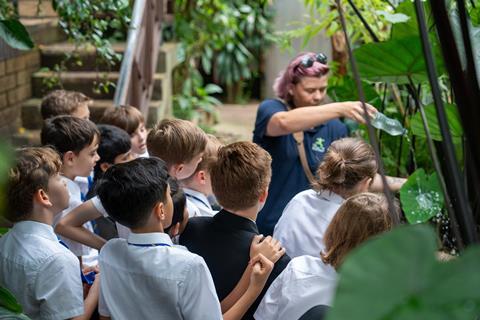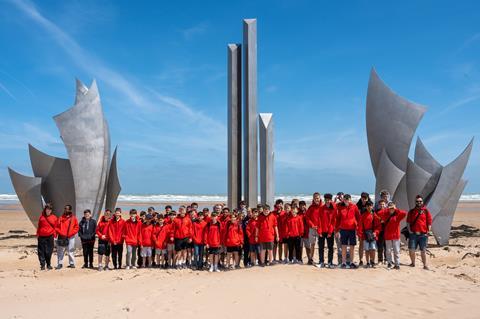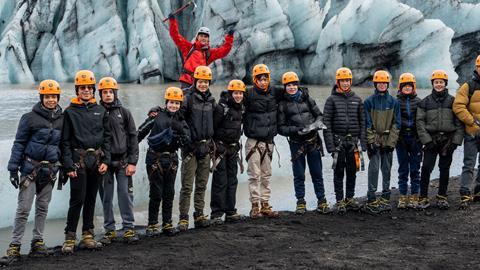Adam Higgins, science teacher at the Royal Liberty School in Romford, on highlights of a trip to Iceland and how he knows a visit has been a success.
How did you get into teaching?

I was selling cars when I left school, but I wanted to do something more worthwhile. So, I did my university course and then went straight into teaching. I trained at the Royal Liberty School and have been here ever since. This is my eighth year as a science teacher and I’m still enjoying it as much as when I first started. Science is definitely the most practical subject to teach, and I love seeing the students develop and become more confident, while also achieving something at the end.
Why are educational visits important to you and your pupils?
It’s about exposing them to different experiences. Regardless of whether that’s a day trip or a residential, all of the trips are important, and lots of students wouldn’t get to experience some of the things we do if they didn’t do them in school. I’m lucky enough to be able to go on so many day and residential visits and can really see the difference in pupils – it opens their eyes. You’re seeing them in a different context away from the classroom.
I think a big part of trips is building relationships and also showing the students that you’re more than just someone who stands at the front of the classroom.

Are there any day trips which stand out for you in 2023?
As cheesy as it sounds, our visits do inspire people to do different things and aim towards future careers. For example, we’ve been to Silverstone, and that’s inspired some of the boys to want to get into motor racing and engineering. We’ve also been to the Living Rainforest, which is somewhere lots of the pupils wouldn’t necessarily go to and made them realise that the world is wider than just Romford or London.
One top tip…
Whenever I book a trip, I always try to make sure it links to at least two subjects because it will give a broader appeal to the pupils who attend, and it adds much more value. You can also get other members of staff involved who might not normally go on an educational visit.
What about residentials, where have you been and how do you organise them?
In terms of overseas visits, I’ll have a rough idea of where we’re going, but I talk to a tour operator for their advice, which in our case is Halsbury Travel. We recently visited Iceland and the team at Halsbury Travel were excellent. They gave us an initial itinerary that we could tweak to our needs and they always come up with things that we wouldn’t think of. I had never been to Iceland and the itinerary was fantastic. They gave us different options and made it much more personalised for the group.
I think a big part of trips is building relationships and also showing the students that you’re more than just someone who stands at the front of the classroom.
What did you get up to in Iceland?
We started off with FlyOver Iceland which was a great first activity. It’s essentially a large simulator which shows you what Iceland is like and the history and culture behind the country. Then we did a nighttime walking tour of Reykjavik which was fantastic, followed by a whale watching tour, and although we didn’t see any whales, we did see lots of dolphins and porpoises which was amazing, especially for students who had never been on a boat before. We saw waterfalls on the Golden Circle tour, which included seeing the Great Geysir erupting. We also enjoyed a glacier walk, a trip to the black sandy beach in Vik and much more that the students had never done before.

Iceland sounds amazing! What should a good tour operator do to help teachers with a trip like this?
It’s all about building a good relationship, so you’ll know that they’ll follow through on what they say. At Halsbury, we’ve got the same sales rep for every single trip we do which is fantastic as it’s one point of call for everything. She knows us and we know them, plus the whole team have been to the places that they’re selling to us, so they will be able to sort out hidden gems for the pupils to experience. It’s just about finding a company that you know will be reliable.
How do you determine if a trip has been a success?
We always chat to the pupils, as well as the staff, to find out what went well and what they would potentially change for next time. It’s so beneficial to catch up afterwards about the whole experience, and in a practical sense, to find out if it’s worth going again. The key things I want to make sure is that it’s good value for money, the pupils enjoyed it, and that they’ve got something out of it rather than just going for a lovely time.
Would you like to feature in a future edition of School Travel Organiser? Get in touch by emailing editorial@schooltravelorganiser.com.











